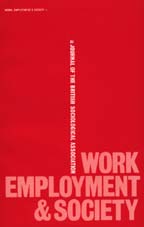No CrossRef data available.
Article contents
AMBIVALENT PATRIARCHS: SHIFTWORKERS, ‘BREADWINNERS’ AND HOUSEWORK
Published online by Cambridge University Press: 01 March 1999
Abstract
The notion of complementarity to analyse the relation between paid work and housework has had a limiting, and possibly misleading, influence upon understanding the persistence of inequality in the home. Through our interviews with a group of male shift working process workers, from three manufacturing firms, we explore their perceptions of their roles and relations at work and in the home. We focus upon their experience and interpretation of gendered role activity – themselves as breadwinners and their wives as homemakers. We explore their attitude to and experience of paid work, and their involvement in housework. We begin by considering the difficulties associated with defining housework, and measuring men’s and women’s levels of activity and responsibility. We consider what being a ‘breadwinner’ means to the process workers, and how they translate this into their responsibility to enable their wives to be at home caring for their children. Then we focus upon one part of housework – laundering. Through this activity we explore the persistence of the unequal division of housework, despite changes in paid work, and highlight ways in which this inequality is sustained. We conclude that ambiguity, paradox and uncertainty undermine the dichotomous ordering of gendered relations, and that the balance and equity implied in the notion of complementarity provides an inadequate explanation of the gendered distribution of housework.
- Type
- Research Article
- Information
- Copyright
- 1999 BSA Publications Ltd




